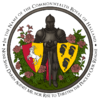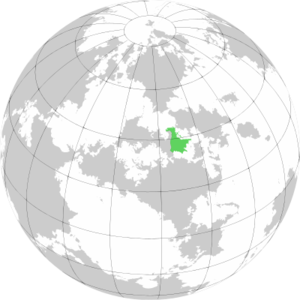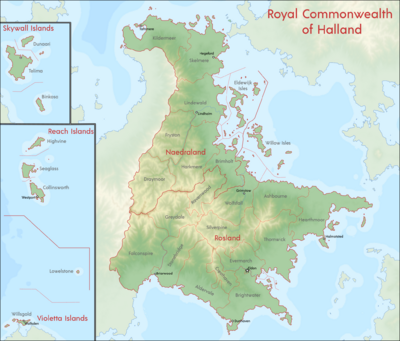Halland: Difference between revisions
No edit summary |
|||
| Line 53: | Line 53: | ||
== History == | == History == | ||
From 5100, missionaries and settlers from the Orkanan Realm of Stoldavia founded several colonies along the northern coast of [[Thultannia]]. By 5600RH, the northern part of the region, mainly coinciding with The Naedraland, was part of the realm. The southern half encompassed two dependencies: Hallingr and Ellingr. [[Fyrirhugun Orkanan]] had replaced [[Thultannian Paganism]]. | |||
Between 6400 and 6600, [[Aldsay]] settlers from the north managed to get a foothold in the area. In the north, the settlers lived side by side with the Indigenous population, but in the south, the arrival of the Aldsay led to massive clashes. Many towns were raided, and some were taken over permanently. The main difference was that the settlers in the south were exiled from Aedeland, while the northern settlers remained in touch with the homeland. The Alday brought the roots of what became the old [[Hallish language]]. | |||
=== 6700-6850 – Cyprien Hordes === | |||
[[Cyprien the Great]] left the [[Axiom River lands]] with a horde of horse lords and armoured foot soldiers after his brother succeeded to his father's death. Instead of fighting for the crown of the Axion tribes, he and his other brothers set forth to build their own realms. Cyprien moved north while his brothers scattered in all different directions, conquering the [[Alsa peninsula]] and using the fleet of the city-states to cross the Medion Sea to a land of green and pleasant hills, Thultannia. Cyprien's brothers settled their short-lived realms; others faltered; Cyprien himself conquered what is now Rosland and Kladania, naming his realm Roseraie after the pink roses native to southern Thultannia; what is now [[Cladania]] was named Clôturie after the indigenous sheep enclosures. | |||
Cyprien conquered the whole of southern Thulthannia, with the [[Westdunn mountains|Westdunn]] and [[Brinor mountains]] forming the boundary between his empire and the northern barbarians. The Penryn narrows entirely within his empire. | |||
In his final years, Cyprien converted to Orkanan, converting all the lords of the empire. After his death, with no living heirs, his empire collapsed into many old Axiomais petty kingdoms. The Axiomais petty kings influenced old Hallish, transforming the language into the middle Hallish language. | |||
== Politics == | == Politics == | ||
Revision as of 01:53, 13 December 2024
| Royal Commonwealth of Halland | |
| Flag | Coat of arms |
|---|---|

|

|
| Motto: "None shall dare against me" | |
| Anthem: The Crownsong | |
| Locator map | |

| |
| Capital city | Eldon |
| Largest city | Halmotsted |
| Official language | Hallish |
| Other languages | |
| Ethnic group | |
| Religion | Mellanhand Orkanan |
| Demonym(s) | Hallish |
| Government | |
| Government Type | Federal constitutional monarchy |
| Queen | Adelaide II |
| First Minister | Z.Y. Bourne |
| Legislature | Parliament House of the Witten House of Roses |
| Establishment | |
| Act of Crown and Union | 7XXX |
| Area | |
| Total | 526,672.86 km2 |
| Water % | xxx |
| Population | |
| Total | 52,964,487.93 |
| Density | 100.56/km2 |
| Economy | |
| Economy type | Market capitalist |
| GDP (total) | Ꞡ 1,779,589,316,166.98 |
| GDP per capita | Ꞡ 33,599.67 |
| Currency | Crown Sterling (₤) () |
| Inequality index | TBA |
| Development index | TBA |
| Other information | |
| Time zone | -3 |
| Driving side | right |
| Calling code | +TBA |
| Internet code | .hal |
Halland is a country in Anaria
Etymology and demonyms
The nation's full name is the Royal Commonwealth of Halland, composed of the Union of Rosland and Naedraland. Halland takes its name from Hallingrland in old Hallish, which translates to ' land of the cliffs' or 'land behind the rocks'. Today, Hallinger derives from the same name and refers to Hallands southern peninsula, known for its white limestone and chalk cliffs.
Two demonyms are popularly used for Halland, Hallish and Hallisian, with Hallish being considered the proper demonym.
It is considered rude to call someone from Naedraland Hallish or Hallisian. The people from this kingdom identify themselves as Untfinzen, which in Hallish is Untfins or Unfins. For example, a city in Naedraland is called an untfinnish city rather than a hallish city.
History
From 5100, missionaries and settlers from the Orkanan Realm of Stoldavia founded several colonies along the northern coast of Thultannia. By 5600RH, the northern part of the region, mainly coinciding with The Naedraland, was part of the realm. The southern half encompassed two dependencies: Hallingr and Ellingr. Fyrirhugun Orkanan had replaced Thultannian Paganism.
Between 6400 and 6600, Aldsay settlers from the north managed to get a foothold in the area. In the north, the settlers lived side by side with the Indigenous population, but in the south, the arrival of the Aldsay led to massive clashes. Many towns were raided, and some were taken over permanently. The main difference was that the settlers in the south were exiled from Aedeland, while the northern settlers remained in touch with the homeland. The Alday brought the roots of what became the old Hallish language.
6700-6850 – Cyprien Hordes
Cyprien the Great left the Axiom River lands with a horde of horse lords and armoured foot soldiers after his brother succeeded to his father's death. Instead of fighting for the crown of the Axion tribes, he and his other brothers set forth to build their own realms. Cyprien moved north while his brothers scattered in all different directions, conquering the Alsa peninsula and using the fleet of the city-states to cross the Medion Sea to a land of green and pleasant hills, Thultannia. Cyprien's brothers settled their short-lived realms; others faltered; Cyprien himself conquered what is now Rosland and Kladania, naming his realm Roseraie after the pink roses native to southern Thultannia; what is now Cladania was named Clôturie after the indigenous sheep enclosures.
Cyprien conquered the whole of southern Thulthannia, with the Westdunn and Brinor mountains forming the boundary between his empire and the northern barbarians. The Penryn narrows entirely within his empire.
In his final years, Cyprien converted to Orkanan, converting all the lords of the empire. After his death, with no living heirs, his empire collapsed into many old Axiomais petty kingdoms. The Axiomais petty kings influenced old Hallish, transforming the language into the middle Hallish language.
Politics
Military
Geography and Climate

Economy
Culture
- Main article: East Hallish Culture